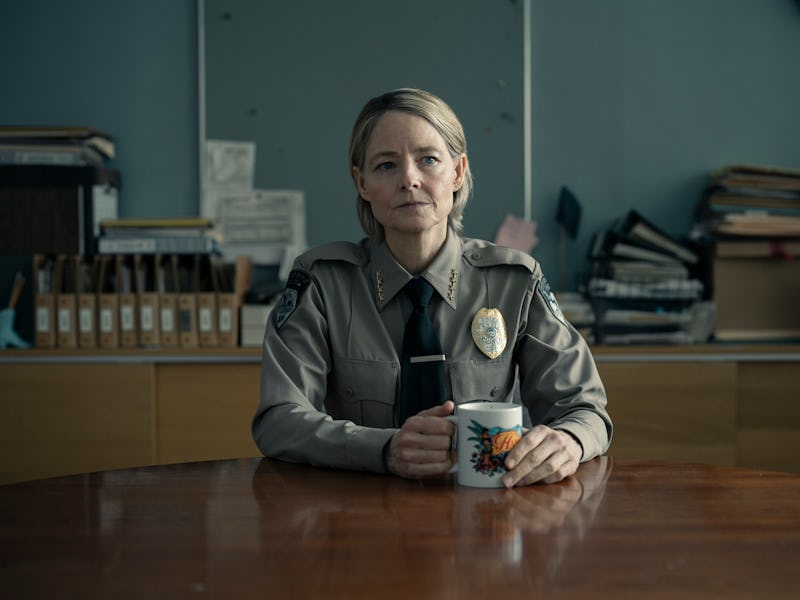How True Detective: Night Country’s Finale Subverts Its Horror Story
"He sees you, Liz."

True Detective: Night Country is haunted by ghosts. Whether it be the literal ghost of Travis Cohle (Erling Eliasson) or the constant, unseen presence of Annie Kowtok (Nivi Pedersen), whose murder haunts the season and its characters, Night Country's six episodes are full of specters both seemingly literal and emotional. And in the True Detective: Night Country finale, they finally and fully come for Evangeline Navarro (Kali Reis) and Liz Danvers (Jodie Foster).
The central Night Country duo spends the majority of the season's finale trapped during a blizzard at the largely abandoned Tsalal Research Station. While there, Liz and Navarro both see inexplicable things, including objects moving on their own and moments in which time and reality seem to completely bend around them. These moments do a lot to up the episode's tension and suffocatingly ghostly mood.
Rather than assaulting viewers with a final round of jump scares and terrifying images, though, Night Country uses its supernatural elements to deliver two instances of shocking emotional catharsis.
True Detective Season 4 Ending Explained
Liz (Jodie Foster) and Navarro (Kali Reis) end up stranded in exactly the worst place imaginable for much of the True Detective: Night Country finale.
Liz and Navarro spend the first portion of their impromptu, nightlong stay at Tsalal interrogating Raymond Clark (Owen McDonnell) and learning the tragic truth of what really happened to Annie Kowtok. Clark confesses to killing her after she discovered the truth of Tsalal’s relationship with the Silver Sky Mining company: that they were intentionally faking data showing the extent of Silver Sky’s pollution, so that they could continue to be sponsored for their research.
Following Clark's confession and his frozen death, the duo then spends hours walking in what seem like circles. They argue, experience visions, and then come back together. All the while, the two spiral deeper and deeper into their own past traumas and wounds.
Their pattern culminates when Navarro dangerously wanders into the snowstorm raging outside Tsalal. As she does, she finds herself walking simultaneously through the same desert dreamscape she's visited multiple times throughout Night Country. Eventually, she closes her eyes, reaches out, and… someone reaches back. Is it the ghost of her sister? Annie? Her mother? Or a manifestation of her own, long-neglected Iñupiaq heritage? It's unclear. But whoever it is, they make contact with Navarro — confirming that she's not insane or alone.
The ghosts come back to Liz and Navarro. But that’s not a bad thing.
This encounter provides Navarro with the sense of comfort that she's long sought. Moments later, an on-the-brink-of-death Liz finally asks Navarro what she heard the ghost of her son, Holden, say. "He says that he sees you. He sees you, Liz," Navarro responds. Hearing this, Liz lets out all the tears and pain that she's been holding inside for years. Both she and Navarro, in other words, find peace not by running from their ghosts, but by acknowledging and reaching out to them. It's a clever twist that, above all else, emotionally pays off all of Night Country's many ghostly jump scares.
And it’s a catharsis that ends in the Liz and Navarro’s that the Iñupiaq women of Ennis, who had realized the truth of Annie K’s murder, were responsible for the deaths of the Tsalal scientists — attacking their station and forcing them at gunpoint to walk out onto the ice without their clothes. But maybe there was something else in the ice that finished the job. The viewer, like Liz and Navarro, are left to decide what they believe.
A Ghost Story Comes Full Circle
True Detective: Night Country proves that time really is a flat circle.
"Time is a flat circle." That line, famously uttered by Matthew McConaughey's Rust Cohle in True Detective Season 1 and repeated again by McDonnell's Raymond in the Night Country finale, has proven to be an unofficial mantra for the HBO anthology series. Throughout all of its four seasons, True Detective has argued that the past, present, and future are all bound together in an unbreakable loop. There's no running from your past the same way that it’s impossible to escape the present and the future. We're all trapped within their collective grasp.
In the end, True Detective: Night Country doesn't refute any of those ideas. On the contrary, its finale embraces the circular nature of time even more than viewers may expect. But by giving Evangeline Navarro and Liz Danvers the cathartic resolutions that it does, the season finds a way to argue that time being a flat circle doesn't necessarily have to be a bad thing. The past may be inescapable, but that also means it's always there — ready for us to find our own answers and catharsis within.